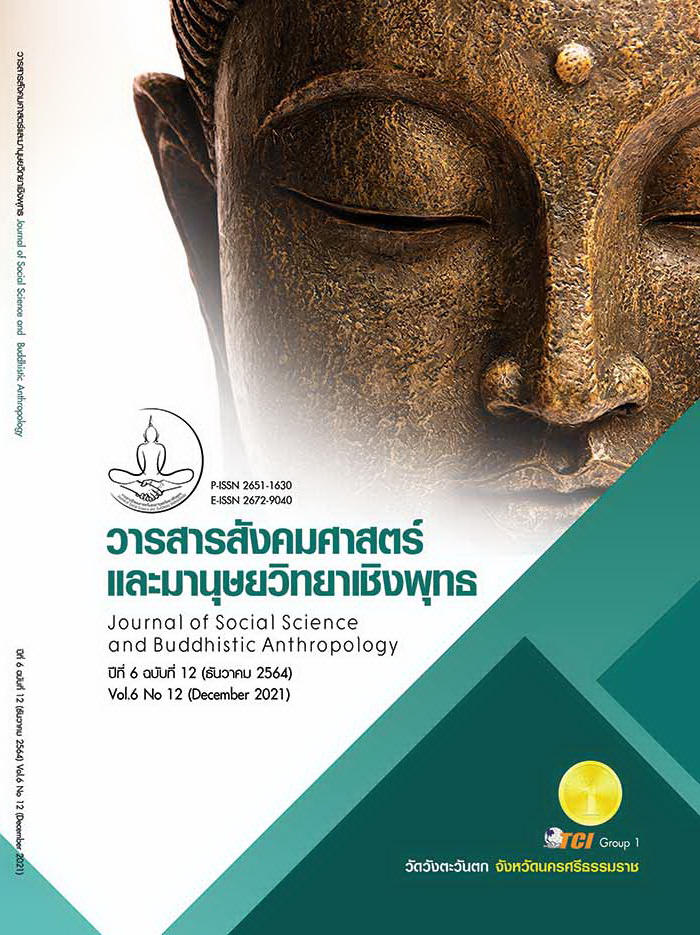TRAINING CURRICULUM DEVELOPMENT TO PROMOTE THE 21ST CENTURY LEARNING DESIGN SKILL WITH PROFESSIONAL LEARNING COMMUNITY (PLC) FOR EDUCATIONAL PERSONAL UNDER SUPHUNBURI PRIMARY EDUCATIONAL SERVICE AREA OFFICE 2
Keywords:
Training Curriculum Development, 21st Century Learning Design Skills, Professional Learning CommunityAbstract
The objectives of this research article were to 1) develop and certify draft training courses that promote 21st century learning design skills through a professional learning community process for teachers under the Office of Suphanburi Primary Educational Service Area 2, 2)to trial and assess the effectiveness of training courses that promote 21st century learning design skills through a professional learning community process for teachers under the Office of Suphanburi Primary Educational Service Area 2. It is a research model of research and development (Research and Development). The samples were selected by a purposive sampling consisted of 137 teachers under the Office of Suphanburi Primary Educational Service Area 2 The instruments used in the research were a document analysis form, a questionnaire, a training curriculum, a training manual, a focus group discussion issues, a curriculum certify assessment form, and satisfaction questionnaire, assessment form. Statistics used in data analysis These are the mean, percentage, and standard deviation. The research findings were found as follows; 1) the training curriculum consists of the following components that promote 21st century learning design skills through a professional learning community process for teachers under the Office of Suphanburi Primary Educational Service Area 2:, principles and importance, curriculum objectives, structure, content and training time rate, training activities manual, training materials and reference resources and measuring and evaluating training, 2) the result of curriculum implementation that promote 21st century learning design skills through a professional learning community process for teachers under the Office of Suphanburi Primary Educational Service Area 2 found the trainees had a high level of learning design skills ( = 4.19, S.D. = 0.89) and trainees were satisfied at a high level (
= 3.66, S.D. = 0.98), and the result of the assess for certify the effectiveness of training curriculum overall was as high level (
= 4.09, S.D. = 0.66).
References
เด่นพงษ์ พลละคร. (2551). การนําความร้ทางทฤษฎีการบริหารบุคคลไปใช้ปฏิบัติ. กรุงเทพมหานคร: มหาวิทยาลัยรังสิต.
พิษณุ ฟองศรี. (2553). วิจัยทางการศึกษา. กรุงเทพมหานคร: ด่านสุทธาการพิมพ์.
ราตรี นันทสุคนธ์. (2553). หลักการวัดและประเมินผลการศึกษา. (ฉบับปรับปรุง). กรุงเทพมหานคร: จุดทอง.
วิจารณ์ พานิช. (2557). การเรียนรู้เกิดขึ้นอย่างไร. (พิมพ์ครั้งที่ 2). กรุงเทพมหานคร: มูลนิธิสยามกัมมาจล.
วิชัย วงษ์ใหญ่ และมารุต พัฒผล. (2552). พัฒนาหลักสูตร และการสอนมิติใหม่. กรุงเทพมหานคร: จรัลสนิทวงศ์การพิมพ์.
วีระวัฒน์ อุทัยรัตน์ และเฉลิมชัย หาญกล้า. (2546). คุณภาพ: ความสำเร็จที่ต้องเริ่มจากภายในสถานศึกษา. วารสารวิชาการ, 6(1), 3-4.
ศิริชัย กาญจนวาสี. (2550). ทฤษฎีการประเมิน. (พิมพ์ครั้งที่ 3). กรุงเทพมหานคร: สำนักพิมพ์แห่งจุฬาลงกรณ์มหาวิทยาลัย.
สํานักงานเลขาธิการสภาการศึกษา. (2552). ข้อเสนอการปฏิรูปการศึกษาในทศวรรษที่สอง (พ.ศ. 2552 - 2561). กรุงเทพมหานคร: บริษัท พริกหวานกราฟฟิค จำกัด.
. (2559). กรอบทิศทางการพัฒนาการศึกษาในช่วงแผนพัฒนาเศรษฐกิจและสังคมแห่งชาติฉบับที่ 10 (พ.ศ. 2550 - 2554) ที่สอดคล้องกับแผนการศึกษาแห่งชาติ (พ.ศ. 2545 - 2559) (ฉบับสรุป). กรุงเทพมหานคร: โรงพิมพ์แห่งจุฬาลงกรณ์มหาวิทยาลัย.
สุเทพ อ่วมเจริญ. (2554). การเรียนรู้แบบมีส่วนร่วม. เรียกใช้เมื่อ 6 กันยายน 2562 จาก http://cddweb.cdd.go.th/tr_di/documentary/tr_dihrddoc004.html
Michael, B. et al. (2010). How the world’s most improved school systems keep getting better. Retrieved September 6, 2019, from https://www.mckinsey.com/industries/education/our-insights/how-the-worlds-most-improved-school-systems-keep-getting-better
Saylor, J. G. et al. (1974). Assessing and analyzing schools as professional learning communities. In Hipp, K. K. & Huffman, J. B. (Eds.), Demistifying professional learning communities (pp. 29-41). Lanham, New York, Toronto and London: Rowman and Littlefield.
Sparks, D. (2002). Designing powerful staff development for teachers and principals. Oxford, OH: National Staff Development Council.
Downloads
Published
How to Cite
Issue
Section
License
Copyright (c) 2021 Journal of Social Science and Buddhistic Anthropology

This work is licensed under a Creative Commons Attribution-NonCommercial-NoDerivatives 4.0 International License.









